THE MIDTERM ELECTIONS AND HEALTHCARE IN TEXAS

SPRING 2023
2 A Publication of the American College of Healthcare Executives of North Texas Chapter | SPRING 2023 6 President’s Message Felixia Colon 8 Texas – Northern Regent’s Message Dr. Trinette K. Pierre 10 Message from the Regent ACHE Regent At Large, District 4 Jim Allard 14 Member Spotlights 17 Chapter Merit Award 34 Event Encore 60 National News 62 Membership Annoucements 64 Calendar of Events FEATURES Remote Patient Monitoring: Improving Patient Experience and Outcomes with a New Source of Revenue for Healthcare Providers Clinical Staff Retention is a Key to Enhancing Healthcare Retention 22 28 Did the Midterm Election Impact Healthcare in Texas? 18
Visit us online ACHENTX.org
EDITORS
Amanda Brummitt , FACHE
Tom Peck , FACHE
Vanessa Lee
Eric Presson, FACHE
Kean Villarta
Byron Westbrook
CONTRIBUTING WRITERS
Audrianne Schneider, FACHE
Kean Villarta
Mike Belkin, FACHE
Shahid Shafi, MD, MBA, MPH
James Taylor, MBA, MAGS
Bert Witherspoon
CREATIVE DIRECTION
Caleb Wills, calebsemibold.com
ADVERTISING/ SUBSCRIPTIONS
info@achentx.org
QUESTIONS AND COMMENTS:
ACHE of North Texas
Editorial Office, c/o Executive Connection
300 Decker Drive, Suite 300 Irving, TX 75062
p: 972.413.8144
e: info@achentx.org
w: achentx.org
2023 CHAPTER OFFICERS
President
Felixia Colón, FACHE
Sr. Vice President & Group Operations Officer
SCP Health
Immediate Past President
Dustin Anthamatten, FACHE
VP Operations – Corporate
Methodist Health System
President-Elect
Aaron Bujnowsk i, FACHE
Director (Partner) & IDN Lead
The Chartis Group
Treasurer
Benton Sprayberry, FACHE
Market President – TX-OK
Main Street Health
Secretary
Patrick Brown, FACHE
Senior Vice President-Operations, National Group Surgery Partners
Diversity, Equity & Inclusion Officer
Ajith Pai, FACHE
President
Texas Health Harris Methodist
Hospital Southwest Fort Worth
4 A Publication of the American College of Healthcare Executives of North Texas Chapter | SPRING 2023
BOARD OF DIRECTORS:
Dr. Jim Allard, DNP, RN, NEA-BC, FACHE
ACHE Regent-at-Large, District 4
Chief Nursing Officer Medical City Arlington
Noreen Butte, MD Senior Physician Executive Cerner Healthcare
Fraser Hay, FACHE President Texas Health Presbyterian Hospital Plano
Carolyn Hunter Chief Operating Officer Medical City Las Colinas
Jared Lange Director, Business Sustainability & Development Parkland Health
Joseph Clayton Lawrence, FACHE Regional President Sound Physicians
Trinette K. Pierre, DHA, RN, NEA-BC, FACHE
ACHE Texas – North Regent Executive Consultant/Advisor, Career Consultant, Professor TRImani Consulting, LLC
Kris Sanders, FACHE SVP Northern Market Growth & Development Children’s Health
Keith Thurgood, PhD Clinical Professor & Program Director, MS Healthcare Leadership and Management University of Texas at Dallas
Michael Talley, RRT, FACHE VP of Clinical Operations & Virtual Care CHRISTUS Health
Toya White, FACHE Chief Operating Officer & Chief Nursing Officer
Texas Health Resources
Corey Wilson, FACHE Chief Operating Officer Texas Health Harris Methodist Fort Worth
Timothy Wilson SVP, Population Health Management P3 Health Partners
Mary R. Wylie, DHA, MBA, MHA, FACHE Vice President and Chief Operating Officer Baylor Scott and White Medical Center Plano
The ACHE of North Texas e-magazine, The Executive Connection, is published triannually and includes information on the latest regulatory and legislative developments, as well as the quality improvement and leadership trends that are shaping and influencing the healthcare industry. Readers get indepth reporting on the issues and challenges facing hospital and health system leaders today. We make it our job to tell you about the great things the organization and Chapter are doing every day to ensure the health of our community. If you have any news and updates that you want to share with other members, please e-mail your items to info@northtexas.ache.org. Microsoft Word or compatible format is preferable. If you have a graphic or picture that you'd like to include, please send it as a separate file. The following are the types of information that our members shared in past ACHE of North Texas magazines, Advocacy Issues, Legislative Issues, Educational Opportunities, Awards / Achievements, Promotions (Members On the Move), Committee Updates, journal submissions, conference submissions, and workshop participations, sharing mentoring experiences, etc.
Message from Our President
Dear ACHE Colleagues:
Wow, how time has passed! As we venture into the end of Q1 2023, the PHE waivers are set to expire, yet we are still impacted by the pandemic: staffing shortages, supply chain issues and now…inflation. Many would agree that the healthcare industry will be forever changed because of the pandemic, but this has allowed for innovation and digital health to be expanded differently than our industry would have expected. The good news is, the world has reopened, allowing for events and conferences to be in person, including ACHE Congress!
As mentioned in our Fall 2022 Executive Connection magazine, our board has been intentional with our Diversity, Equity, and Inclusion initiatives. We are happy to report, we have instituted an official DEI board position for 2023. Our chapter has grown to more than 1700 members throughout the DFW metroplex and it is imperative that our board ensures there is representation and inclusivity at all levels within our chapter. Due to this abundant growth, we have created new committees: Membership -to focus on engaging new members to our chapter; Physician Advisory - created to incorporate more physicians into our chapter and support their initiatives; and Advocacy - created to raise awareness with healthcare issues impacting our communities. We’ve also expanded the advertisements of other non-ACHE events in our weekly newsletter to highlight other healthcare organizations. Our close alignment with North Texas’ National Association of Health Services Executives (NAHSE), National Association of Latino Healthcare Executives (NALHE) and our own Asian Healthcare Leaders Community of North Texas (AHLCNTX) and Women’s Healthcare Executives’ Network (WHEN), will allow us to work collectively to make certain our goals work in tandem to serve our members.

6 A Publication of the American College of Healthcare Executives of North Texas Chapter | SPRING 2023
Although 2023 still has a lot of uncertainties, I am still optimistic with our board’s objectives for this year. To grow our chapter to be the largest within ACHE National, to have our board be more representative of our members, to increase inclusivity, to advance more members to Fellow status and to collaborate with other non-ACHE healthcare organizations and communities. Cheers to 2023!
 Felixia Colon, FACHE Sr. Vice President & Group Operations Officer SCP Health
Felixia Colon, FACHE Sr. Vice President & Group Operations Officer SCP Health

Message from Our ACHE Regent, Northern
Dearest ACHE Texas Northern Region Members,
Happy and blessed 2023 to you all! This year is off to a fast start. I pray everyone is doing well and navigating the new year with ease and peace.
As this is the first Regent’s Message for 2023, I would like to shine a spotlight on our 2022 Texas Northern Regent’s Award recipients. We were excited to honor these amazing individuals at prior events and would like to continue the celebration by recognizing them further in this publication.
ACHE Texas Northern’s 2022 Regent’s Award Recipients
2022 ACHE of North Texas Executive Leadership Change Catalyst Regent’s Award

Dr. Ajith Pai – President, Texas Health Harris Methodist Hospital Southwest Fort Worth
Dr. Pai was awarded the Executive Leadership Change Catalyst award to recognize his extensive and ongoing work in the diversity, equity, and inclusion (DEI) realm. Dr.

8 A Publication of the American College of Healthcare Executives of North Texas Chapter | SPRING 2023
Pai has been instrumental in spearheading many initiatives related to DEI both within ACHE and within healthcare organizations throughout DFW. Dr. Pai is a leader who cares beyond his duties and this is evident in his dedication and willingness to fight for causes that affect us all. DEI initiatives will continue to be discussed, incepted, and upheld in part because of Dr. Pai’s efforts.
Thank you, Dr. Pai, for being a strong force in the DEI space. We appreciate your dedication to ensuring healthcare and professional diversity, equity, and inclusion is achieved and maintained. You are greatly appreciated and respected.
the more difficult initiatives of ACHENTX whenever the need arises. We appreciate you and honor your dedication to our chapter. Thank you for being phenomenal.
Angela was honored as our ACHE of North Texas

Dr. DeLancey Johnson – SVP, Associate Talent Officer, Parkland Health & Hospital System
Emerging Leader Regent’s Award recipient to showcase her dedication to our chapter’s success. Angela is known to consistently volunteer for duties and tasks that stretch and grow her leadership prowess. She has volunteered for various processes, projects, and initiatives that were integral to the success of ACHENTX, some of which were difficult to manage. Angela has proven to be an individual to watch in the leadership realm and we look forward to continuing to watch her progress her career.
Angela, thanks for consistently volunteering to help with
Dr. Johnson was recognized as ACHENTX’s Executive Servant Leader Regent’s Award recipient to honor his dedication to volunteerism in his community. Dr. Johnson has volunteered to serve his community as a volunteer representing his healthcare system in community-based events, as a leader assisting other healthcare organizations with community-focused volunteer projects, as a willing volunteer on panels and committee partnerships within ACHENTX, and as an individual who dedicates much of his free time volunteering in his community. Dr. Johnson is a strong advocate of reaching those who are underserved and underrepresented in our communities and proudly serves as a mentor for young men who need a strong role model and confidant to help them navigate the journey to adulthood and manhood.
Dr. Johnson, thank you for dedicating your time, energy, and expertise to those in need. We appreciate your neverending quest to make our communities healthier for those in need. We’re proud of you!
 2022 ACHE of North Texas Emerging Leader Regent’s Award
Angela Vincent Michael – Director of Performance Improvement, Methodist Health System
2022 ACHE of North Texas Executive Servant Leader Regent’s Award
2022 ACHE of North Texas Emerging Leader Regent’s Award
Angela Vincent Michael – Director of Performance Improvement, Methodist Health System
2022 ACHE of North Texas Executive Servant Leader Regent’s Award
John Carter is our ACHENTX Chapter Connector Regent’s Award recipient for 2022. He has earned this recognition 10 times over; therefore, we are proud to recognize him for his dedication to ACHENTX. John is the person who eagle eyes the crowd at ACHENTX events to ensure everyone feels at home and welcomed. He is consistently seen maneuvering his way from person to person to find unfamiliar faces. He introduces those who may be new to our events to those who are staples within the ACHENTX family. John is a well-decorated and respected veteran whose service extends well into many realms, including the healthcare field. John brings his love for serving and protecting others to our ACHENTX events by making it his business to get others comfortable and involved in what we are doing as a chapter. We appreciate John’s dedication to inclusivity and we honor his warm and welcoming spirit.
John, thank you for your service to others, both as a veteran and as a member of ACHENTX’s committees. Thank you for taking the time to care for those who attend our events. We appreciate your kindness and concern for those whose paths you cross. Keep up the great work!

Kerrie Anne Ambort Clark was recognized as our East Texas Forum’s Chapter Connector Regent’s Award recipient. Kerrie Anne works tirelessly to ensure ACHE stays highlighted in the minds of those within her community by partnering with board members, faculty, and organizations in the East Texas region to host ACHE events. Kerrie Anne has been an ambassador for ACHE in this respect. She not only ensures her organization is well versed and maintains visibility within the ACHE realm, but she also ensures she consistently spreads the word about the benefits of ACHE with her students, fellow faculty members, and those in her business community. Although Kerrie Anne is a very busy woman, she makes time to promote ACHE initiatives and build connections that may potentially forge relationships with ACHE in the future. Kerrie Anne is dedicated to ensuring ACHE is seen as the leading organization for healthcare executives in her community and her efforts in representing ACHE in her community is evident of that dedication.
Kerrie Anne, thank you so much for caring beyond your borders. Thank you for working tirelessly to ensure ACHE has a voice in your community. We appreciate your

10 A Publication of the American College of Healthcare Executives of North Texas Chapter | SPRING 2023
2022 ACHE of North Texas Chapter Connector Regent’s Award
John P. Carter – Brand Ambassador ~ Pinnacle Healthcare Consulting
2022 East Texas Forum of ACHE Chapter Connector Regent’s Award
Kerrie Anne Ambort Clark - Executive Director/Senior Lecturer, The University of Texas at Tyler, Soules College of Business - EMBA-HCM Program
dedication to our organization. Keep connecting!

To all of our 2022 Regent’s Awards recipients, I am honored to have the privilege of presenting you in this manner. Thank you for devoting your lives to caring beyond your job duties and career responsibilities. Thank you for giving of yourselves to foster the growth of ACHE. Most importantly, thank you for being you!
Many blessings to all of our members in 2023.
 Dr. Trinette K. Pierre, DHA, BSN, RN, CCC, CEC, CHLC, FACHE, NEA-BC Regent – Texas Northern
Dr. Trinette K. Pierre, DHA, BSN, RN, CCC, CEC, CHLC, FACHE, NEA-BC Regent – Texas Northern
Message from the Regent – ACHE Regent At Large, District 4
“Better Together,” in 2023!
Colleagues,
As your District 4, Regent At Large, I hope and trust your 2023 is off to a great start! I am honored and privileged to have been appointed to serve as the American College of Healthcare Executives (ACHE) Regent-at-Large for District 4 over the last year, and look forward to a new 3-year appointment to begin at Congress in March (2023-2026). This role is a support role for the diversity, equity and inclusion (DEI) agenda for ACHE, to the regents, and the DEI committees for the ten states, in District 4. I look forward to learning and supporting each of the areas.
With our changing healthcare landscape, healthcare leadership is more important now than it ever has been. We have an opportunity to raise the bar and collaborate on alternative models of care and share best practices to continue to provide exceptional care to our communities and markets.
With that said, I am ecstatic about the work through the ACHENTX Board with the inaugural “Chief Diversity, Equity and Inclusion Officer role.” This Board role truly shows the innovation, and priority that the ACHENTX Board has placed on diversity, equity, and inclusion. In addition, ACHE National is collaborating with a third party to develop a robust strategic plan to enhance diversity, equity and inclusion. I look forward to having more dialogue on the direction and detail when it is available.
I look forward to connecting with you and other ACHE Colleagues at the 2023 Congress on Healthcare Leadership in March. You still have time to register! In service, please reach out if I can be of assistance.
Jim Allard District 4 Regent At Large LGBTQ Healthcare Leaders Community Committee – Chair

12 A Publication of the American College of Healthcare Executives of North Texas Chapter | SPRING 2023
AMERICAN
2023 AWARD OF
We are thrilled to announce our ACHE of North Texas chapter has been recognized with the Award of Chapter Merit as part of the 2023 ACHE Chapter Management and Awards Program.
Congratulations and a special thanks to the village of volunteers, sponsors and supporters who have made this honor possible!
A Publication of the American College of Healthcare Executives of North Texas Chapter | SPRING 2023 13
COLLEGE OF HEALTHCARE EXECUTIVES CHAPTER MERIT
Member Spotlight
Parker Beasley, MSHA, MBA

What are you doing now?
I am the Director of Business Development and Interim Director of Operations for Baylor Scott & White Heart Hospitals. I cover all three campuses. I did my Administrative Fellowship with Baylor Scott & White The Heart Hospital in 2020 and have been with them since.
Prior to joining Baylor Scott & White, I worked in Finance with UAB Medicine, All State, and Service Master.
In your opinion, what is the most important issue facing health care today?
I believe that the most important issue in healthcare today is whether value based care will expand. The shift from fee for service to a more capitated fee has been around for years and more value based care has been implemented. Will it replace fee for service?
How long have you been a member of ACHE?
I joined as a student member during my Master of Science in Health Administration program at University of Alabama at Birmingham.
Why is being a member important to you? Has ACHE membership been a benefit in your career?
ACHE provides an opportunity to network with other members and gain a new perspective. I appreciate the educational opportunities of ACHE. I will be pursuing my ACHE Fellow soon.
What advice would you give early careerists or those considering membership?
Parker’s advice to early careerists is to get involved and be open to trying various things and opportunities. Be open to change.
Tell us one thing that people don’t know about you. I have never chewed gum.
14 A Publication of the American College of Healthcare Executives of North Texas Chapter | SPRING 2023
“Get involved and be open to trying various things and opportunities. Be open to change.”
Member Spotlight
Blake Kretz, FACHE
What are you doing now?
I am currently the President at Texas Health Resources Arlington Memorial, a hospital with a rich history that opened in 1958. The hospital is a Level IV Trauma Center (in pursuit of Level III), Cycle III Chest Pain Center, Primary Stroke Center, Level III Neonatal Intensive Care Unit, and Level III Maternal Care. We have a comprehensive lung program, as well as a hyperbaric and wound care center. And, I’m proud to share that we became a Breast Imaging Center of Excellence last year.
I have been with Texas Health Resources for 16 years, previously serving as President of Texas Health Resources Cleburne. Prior to my time in Cleburne, I spent just over 11 years as the Chief Executive Officer of Graham Regional Medical Center.

In your opinion, what is the most important issue facing health care today?
I believe that the most important issue in healthcare today is staffing. All team members are in short supply and recruiting them post pandemic has been a major challenge. Registered nurses, operating room staff, emergency department staff, techs, environmental services, cooks and physicians are much harder to find and hire.
How long have you been a member of ACHE?
I have been a member for over 25 years, having joined shortly after graduating from Trinity University with a Masters in Healthcare Administration. I also took the additional steps to become a Fellow.
Why is being a member important to you? Has ACHE membership been a benefit in your career?
I have found ACHE membership as a major factor to success. I have enjoyed learning about other members and how they make an impact on their organizations. I have learned best practices from a variety of ACHE leaders and members. I believe that people who are involved with ACHE want to make a positive impact on their organization and healthcare. I want to be associated with these people.
What advice would you give early careerists or those considering membership?
My advice to early careerists is to get involved. I encourage them to try new things and volunteer.
As I said, I’ve been part of ACHE for 25 years and it is a great place to get involved. I’ve also spent a lot of time volunteering with CASA (Court Appointed Special Advocates) Johnson County and with Arlington Chamber of Commerce. I also serve on several healthcarerelated boards and committees as well including Texas Rehabilitation Hospital Arlington, Texas GI Center, Texas Health Ambulatory Surgery Center Arlington, Texas Hospital Association Council on Policy Development and Precinct 2 Healthcare Advisory Council, and I’m currently the Chair of the DFW Hospital Council.
Tell us something that people don’t know about you. After college, I sold encyclopedias door to door. It is one of the hardest jobs I have had. Also prior to entering hospital leadership, I was an Orthopedic Physician’s Assistant at Orthopedic Associates in Lewisville.
Member Spotlight
Frederick Ridge, MSM, CSSGB
What are you doing now?
I am the Director of Supply Chain for the Baylor Scott & White Health’s heart hospitals. I lead supply chain management for all three facilities in the Dallas Fort Worth market (Denton, McKinney, and Plano) managing over $150 Million in supplies.

I’ve been with Baylor Scott & White Health for just over five years and have been honored to serve on the Point-ofUse Selection Committee for System Supply Chain Services, successfully complete a recent Joint Commission without any findings in the department, increase employee engagement by 8%, resulting in the 92nd percentile (second highest in the East Region with a 100% staff participation), implement cross training across all three campuses, and executive sponsor for The Heart Hospital Denton Heart Supply Chain Project resulting in $120K in credits and complete revitalization of PARs across the campus.
In your opinion, what is the most important issue facing health care today?
I believe that the most important issue for healthcare is cost containment. Healthcare costs are out of control and managing the cost of healthcare delivery is of utmost priority.
How long have you been a member of ACHE?
I joined ACHE in September of 2022. Why is being a member important to you? Has ACHE membership been a benefit in your career?
I joined to network with other ACHE members. I want to continue progressing in my career in hospital operations and believe that the ACHE can help prepare me for the next steps in my career.
What advice would you give early careerists or those considering membership?
My advice to early careerists is to stay teachable. Continue to learn and grow.
Tell us one thing that people don’t know about you. I am a non-denominational pastor.
16 A Publication of the American College of Healthcare Executives of North Texas Chapter | SPRING 2023
Our Mission



To extend the healing ministry of Jesus Christ.

A Publication of the American College of Healthcare Executives of North Texas Chapter | SPRING 2023 christushealth.org A Catholic health system in the United States, Mexico, Chile, and Colombia with more than 60 hospitals, 600 services and facilities, 45,000 associates and 15,000 physicians.
DID THE MIDTERM ELECTION IMPACT HEALTHCARE IN TEXAS?
 By Michael Belkin, JD, MSHA, FACHE, CMPE
By Michael Belkin, JD, MSHA, FACHE, CMPE
18 A Publication of the American College of Healthcare Executives of North Texas Chapter | SPRING 2023
In Texas, the midterm election had a Republican sweep across the board and was relatively uneventful with only 46% of registered voters participating. This was 400,000 people less than those who participated in 2018. In other states, the results were more dramatic and voter participation was significantly higher. Healthcare did not appear to be a major sway during the midterm election in Texas even though there were substantive issues on debate including reproductive rights, Medicaid expansion, drug costs, and telehealth.
For decades it has been discussed that the cost of healthcare is unsustainable and that the US population is not healthy. Specifically in Texas, about 40 percent of Medicare beneficiaries 65 and older have four or more chronic conditions. Multiple chronic conditions further increase risks, compromise function, complicate treatment, and increase costs. By 2035, there will be 78 million people 65 years and older, compared to 76.4 million under the age of 18. This will further strain the cost and resources of healthcare since the aging population uses a significantly higher percentage of healthcare services than do younger cohorts.
There are several key issues regarding healthcare cost and outcomes that Texas needs to address to ensure great healthcare for all Texans including reproductive rights, Medicaid expansion, pharmaceutical drug spending, and telehealth.
REPRODUCTIVE RIGHTS
Reproductive rights were a significant factor in the midterm elections in the United States. Across the nation, younger voters spoke strongly with their votes that this is a major issue to them. Four out of ten voters stated that the Supreme Court decision to overturn Roe v. Wade impacted their motivation to cast a vote in the midterm election. Several states including California, Vermont, Kentucky, and Michagan passed State laws protecting reproductive rights. In very tight races in Pennsylvania and Arizona, voters came out to show their support of candidates who would protect reproductive rights.
However, in Texas, Republicans swept statewide and shored up the Legislature’s anti-abortion bloc. In addition, at least three more cities passed local ordinances banning the procedure. The future may show that residents and physicians are not in agreement with this outcome. Physicians may not want to practice in Texas due to the abortion ban and Texas residents may move to states where the procedure is not illegal. OBGYN recruitment is already a challenge; maternal rights issues may become a recruitment issue for healthcare organizations seeking OBGYNs.
MEDICAID EXPANSION
Texas has the highest percentage (18%) and total number of uninsured residents compared to the other 49 states. Texas has not expanded access to Medicaid; one of only 11 states not to do so. The large number of uninsured Texas residents is a significant strain on hospital margins. Cost of healthcare must be controlled better. Texas has a strong economy with many residents who have commercial insurance. However, caring for the 5,224,000 uninsured residents continues to be an issue. For example, 20% of adults under the age of 50 (roughly 2.3 million Texans) have anxiety, depression, or other mental health conditions. Those who are uninsured or underinsured will continue to suffer.
Medicaid expansion in Texas can open the door to insure an additional 1.2 million residents. Expansion would lead to an additional $5 billion in federal funding each year. A poll in 2020 found that 69% of Texans support expanding Medicaid. Hospital administrators need to keep hospitals open and treating uninsured patients without compensation is not a viable, long-term option. The expansion of access to Medicaid would provide in-excess-of $5 billion dollars of federal funding each year. This amount of additional funding could make an immediate impact for those hospital administrators trying to
A Publication of the American College of Healthcare Executives of North Texas Chapter | SPRING 2023 19
find a positive margin and take care of their covered lives.
PHARMACEUTICAL DRUG SPENDING
Texas needs to control the cost of pharmaceutical drugs better and this issue has not been addressed adequately. Specifically, Medicare’s ability to negotiate with big pharmaceutical companies on the cost of drugs must be addressed. The US spends over $4 trillion on healthcare; pharmaceutical drugs account for 10% of the total spend.
The Inflation Reduction Act passage is a step in the right direction. The bill empowers the Health and Human Services Secretary to negotiate prices for certain drugs covered under two different parts of Medicare. The legislation also caps out-of-pocket costs at $2,000 starting in 2025 for people who participate in Medicare Part D, the prescription drug plan for seniors.
TELEHEALTH
Telehealth reimbursement was not addressed during the midterm election. Virtual care expanded significantly during the COVID lockdown. Patients found the ease and convenience of virtual care to be satisfying and positive for a strong patient experience. Patients also found virtual care to be more personalized care. To maintain these gains, reimbursement will eventually need to be addressed.
The following articles were referenced in writing this story:
https://www.texastribune.org/2022/11/07/texas-medicaidexpansion-republicans/
https://www.axios.com/local/austin/2022/08/22/medicaidexpansion-unlikely-texas
https://www.texastribune.org/2022/11/09/texas-midtermselection-abortion/
https://www.texastribune.org/2022/10/19/abortion-texas-voters/
https://ldi.upenn.edu/our-work/research-updates/what-thesurprising-midterm-results-mean-for-health-care-policy/
https://stateofreform.com/featured/2022/11/texas-women-rallyaround-abortion-ahead-of-2022-midterm-elections/






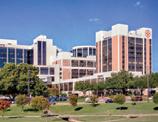

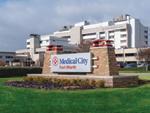
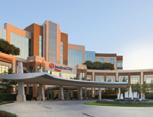


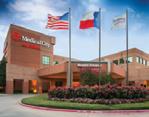


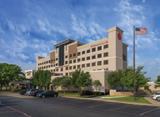


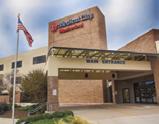

Remote Patient Monitoring: Improving Patient Experience and Outcomes with a New Source of Revenue for Healthcare Providers
 Shahid Shafi, MD, MBA, MPH
Shahid Shafi, MD, MBA, MPH
The healthcare industry is undergoing a significant transformation, driven by a growing focus on improving access to care at or close to patients’ homes. An emerging digital tool in this space is Remote Patient Monitoring (RPM). Using Wi-Fi or cellular enabled devices at home, patients transmit their data to a central monitoring system in real time. A plethora of devices are now available to meet the needs of the patients at home. The information from these devices is then shared with their healthcare providers in real time or asynchronously, depending upon predefined clinical criteria.
RPM is proving to be a cost-effective, convenient and efficient way to improve patient outcomes, reduce the cost of care, and prevent hospital admissions/readmissions. It also has the potential to transform healthcare from treating illnesses to promoting health and wellness, thus enhancing quality of care.
Patient Experience
With the spread of “consumerism” in healthcare, convenience and easy access to care has become an important differentiating factor for patients, when it comes to choosing their providers. RPM provides patients with the care and support they need in the comfort of their own homes. It is particularly useful for those with chronic conditions (e.g., diabetes, congestive heart failure, COPD), those transitioning from acute or post-acute care facilities to home, and those who may qualify for “hospital-at-home” care.
Another key advantage of RPM is increased patient satisfaction, through engaging and empowering patients in their own care. By having access to their own health information, patients can make informed decisions and take an active role in their care. This can help to improve compliance with treatment plans and lifestyle changes, which can improve patient outcomes.
Improved Outcomes
A primary benefit of RPM is early detection of
changes in a patient’s condition, thus preventing complications, ED visits, hospital admissions, and readmissions. It allows healthcare providers to monitor patients more frequently and intervene early, before it deteriorates further. For example, if a patient’s blood pressure or blood glucose levels are elevated, healthcare providers can respond quickly, adjust treatment plans, and prevent potential complications.
Another key benefit of RPM is monitoring compliance with treatment at home. Devices, such as the smart pillbox, helps keep track of the medications at home, their dosage, and the frequency, ensuring that patients take the right amount of medication at the right time. It can generate alerts for the patients to take their medications, as well as increase accountability by providing a complete record of medicinal intake.
RPM can also use gamification techniques to make the monitoring process more engaging and fun. For example, patients can be rewarded
A Publication of the American College of Healthcare Executives of North Texas Chapter | SPRING 2023 23
for meeting certain health goals, such as taking their medication on time, or for reaching a certain number of steps each day. This can create a sense of accountability and motivation for patients to adhere to their treatment plan.
Financial Benefits for Healthcare Providers
RPM can reduce the costs to the hospitals associated with readmissions. By enabling patients to receive treatment at home, home health services can lower staffing costs. Office-based practitioners can reduce the burden of phone calls from patients on their staff and minimize disruptions in their schedules by using RPM to provide proactive care at home using predefined treatment algorithms.
RPM can also help medical practices, hospitals, and home health providers to improve their revenue streams:
• Reimbursement for RPM: On a per patient per month basis from Medicare and other payers, without the need for direct physician interaction.
• Increased patient satisfaction: By providing
convenient and accessible services at home, RPM can lead to increased patient satisfaction and loyalty.
• Increased efficiency: RPM reduces the need for in-person visits for routine check-ins and monitoring, reducing the time and resources required for in-person visits and improving the efficiency of the practice.
• Increased revenue from new patient populations: RPM can make healthcare services more accessible to patients who have difficulty traveling, such as elderly patients or those living in rural areas.
• Improved coding and billing accuracy: RPM provides a wealth of data that can be used to support accurate coding and billing, potentially reducing the risk of denied claims and increasing revenue.
Implementation of RPM
The implementation of RPM requires careful planning and preparation. The first step is to identify the patients who are suitable for RPM. This may include

24 A Publication of the American College of Healthcare Executives of North Texas Chapter | SPRING 2023
Fig.1: Efficient collection, transmission, tracking and analysis of patients’ health data in real-time with remote monitoring
patients with chronic conditions, those who have recently been discharged from the acute care or post-acute facilities, and others who require ongoing monitoring and treatment, including “hospital at home.”
Once the patient population has been identified, healthcare facilities need to choose the appropriate RPM technology. There are a variety of options available, including wearable devices, mobile applications, and remote monitoring systems - each with its own advantages and disadvantages.
The next step is to train healthcare providers, support staff, and patients and their caregivers at home. This includes training on how to use the technology, how to interpret the data, and how to effectively communicate with patients.
Healthcare providers also need to establish clear clinical guidelines for RPM, including the frequency of monitoring, the types of data and information that will be collected, and the response time for addressing changes in a patient’s condition. These protocols and guidelines should be clearly communicated to patients, as well as their families and caregivers, to ensure their understanding and expectations.
In conclusion, RPM is an effective solution for improving patient outcomes, reducing cost of care, and an important new source of revenues for healthcare providers.
Fellow ACHENTX Board Members

attend October 21, 2022 Dallas-Fort Worth Hospital Council’s
74th Annual Awards Luncheon to cheer on Patrick Brown, FACHE (center) as he receives their Young Healthcare Executive of the Year Award.
Congratulations, Patrick!







2023 BOARD OF DIRECTORS
Officers:
President
Felixia Colón, FACHE
Sr. Vice President & Group Operations Officer
SCP Health
Immediate Past President
Dustin Anthamatten, FACHE VP Operations
Corporate Methodist Health System
President-Elect
Aaron Bujnowsk i, FACHE Director (Partner) & IDN Lead The Chartis Group
Treasurer
Benton Sprayberry, FACHE Market President – TX-OK Main Street Health
Secretary
Patrick Brown, FACHE
Senior Vice President-Operations National Group, Surgery Partners
Diversity, Equity & I nclusion Officer
Ajith Pai, FACHE
President
Texas Health Harris Methodist Hospital Southwest Fort Worth
Board of Directors:
Dr. Jim Allard, DNP, RN, NEA-BC, FACHE
ACHE Regent-at-Large, District 4
Chief Nursing Officer Medical City Arlington
Noreen Butte, MD Senior Physician Executive Cerner Healthcare
Fraser Hay, FACHE
President
Texas Health Presbyterian Hospital Plano
Carolyn Hunter Chief Operating Officer Medical City Las Colinas
Jared Lange Director, Business Sustainability & Development Parkland Health
Joseph Clayton Lawrence, FACHE Regional President Sound Physicians
Trinette K. Pierre, DHA, RN, NEA-BC, FACHE ACHE Texas – North Regent Executive Consultant/Advisor, Career Consultant, Professor TRImani Consulting, LLC
Kris Sanders, FACHE SVP Northern Market Growth & Development Children’s Health
Keith Thurgood, PhD Clinical Professor & Program Director, MS Healthcare Leadership and Management University of Texas at Dallas
Michael Talley, RRT, FACHE VP of Clinical Operations & Virtual Care CHRISTUS Health
Toya White, FACHE Chief Operating Officer & Chief Nursing Officer Texas Health Resources
Corey Wilson, FACHE Chief Operating Officer Texas Health Harris Methodist Fort Worth
Timothy Wilson SVP, Population Health Management P3 Health Partners
Mary R. Wylie, DHA, MBA, MHA, FACHE
Vice President and Chief Operating Officer Baylor Scott and White Medical Center Plano
A Publication of the American College of Healthcare Executives of North Texas Chapter | SPRING 2023 27
CLINICAL STAFF RETENTION IS A KEY TO ENHANCING HEALTHCARE EXECUTIVE RETENTION
 By James Taylor, MBA, MAGS Group President and CEO of Physician and Leadership Solutions for AMN Healthcare
By James Taylor, MBA, MAGS Group President and CEO of Physician and Leadership Solutions for AMN Healthcare
The burnout that nurses, physicians and other clinical professionals have experienced as a result of COVID-19 and other factors has been well documented. AMN Healthcare research indicates that 57% of nurses feel burned out most days while 23% are likely or very likely to leave nursing as a result of the pandemic. Close to 60% of physicians feel burned out most days, compared to 40% prepandemic, while 37% would like to retire in the next year. Both nurses and physicians are very much a part of the “Great Resignation” that has seen millions of workers of all kinds walk away from their jobs.
What is less noted is the burnout being experienced by healthcare executives. Just as the pandemic exacerbated stresses already being felt by nurses and physicians, it also compounded the challenges healthcare professionals face. Key among these
are the always difficult challenges presented by the revenue cycle.
Hospitals have generally experienced downward operating margins over the last year to 18 months and relative to pre-pandemic levels. The American Hospital Association’s Current State of Hospital Finances Report, September 2022 projects that hospital margins will be down 37% in the latter part of 2022 relative to pre-pandemic levels. According to Kaufman Hall’s December 2022 National Hospital Flash Report, hospital margins overall were down every month of 2022 through November. With its strong economy, some North Texas hospitals have fared better than those in rural Texas and other areas of the country, but finances remain a continuous challenge for healthcare leaders everywhere.
A Publication of the American College of Healthcare Executives of North Texas Chapter | SPRING 2023 29
This is a challenging time for healthcare professionals, both those in clinical roles and those in executive leadership.
What is new is that financial challenges are no longer the most pressing concern facing healthcare executives. The American College of Healthcare Executives conducts an annual survey tracking the most immediate concerns and priorities of hospital Chief Executive Officers (CEOs). Its most recent survey, based on 2021 data, indicates the following:
Top Priorities Facing Hospital CEOs
• Personnel shortages
• Financial challenges
• Patient safety and quality
• Behavioral health/addiction
• Government mandates
• Access to care
• Patient satisfaction
• Physician-hospital relations.
Notable here is that “financial challenges” had been the number one concern of hospital CEOs identified in the survey every year since 2004. Finances are almost always the primary concern of healthcare executives, but today, “personnel shortages” are in the top spot. Personnel shortages are, of course, linked to financial challenges since they often lead to higher labor costs. The American Hospital Association projects hospital labor costs will have increased in 2022 by $86 billion over 2021 levels, while non-labor expenses such as equipment and supplies will have increased by $49 billion, largely due to inflation. Lack of adequate staffing also can inhibit revenue generation by reducing availability of services. Kaufman Hall found that 66% of facilities surveyed said staffing shortages have required their organizations to run at less than full capacity.
Personnel shortages also are closely linked to other highpriority concerns of hospital leaders listed above, such as patient safety and quality, behavioral health, access to care, patient satisfaction, and physician-hospital relations.
The escalating challenges that healthcare leaders face – many of them related to personnel shortages – are a key factor driving burnout and turnover among hospital CEOs and other executives. Other factors that also drive executive turnover such as the aging demographics of
physician leaders, system consolidation, and evolving leadership roles and responsibilities remain in play. Important to note, however, is the interrelation between nurse, physician and other clinician satisfaction and retention, and the satisfaction and retention of healthcare leaders. If hospitals and other healthcare facilities can improve the satisfaction and retention of their clinical staff -- and thereby solve one of their greatest challenges -they can improve the satisfaction and retention of their own leaders.
A STRATEGIC REASSESSMENT
When it comes to executive leadership retention and more broadly on issues of total talent solutions, a reassessment of each facility’s relations with its clinical staff is vital. Factors to consider include:
Quality of the Work Environment. Retention of nurses, physicians and other clinical professionals is tied most directly to the quality of their work environment. Surveys consistently confirm that clinical professionals derive their greatest satisfaction from providing patient care. Sources of dissatisfaction consistently are tied to those duties or obligations that distract them from patient care or inhibit the quality of care they can provide.
In the case of nurses, these distractions can include work allocation that requires them to restock supplies, engage in heavy manual labor such as lifting patients, and excessive documentation/paperwork. Today, nurses also are increasingly concerned about high patient to nurse ratios which limit their ability to provide quality care to each patient.
Physicians have similar concerns, particularly over excessive quality documentation, reimbursement requirements, access to tests, equipment and patient records, and even inconvenient parking. Nurses, physicians and other clinicians today also express a growing desire for schedule flexibility. Often, schedule flexibility can be a higher priority than compensation increases.
In light of COVID-19, many healthcare facilities engaged in morale-boosting events such as free lunches for clinicians or prominent recognition programs, and also provided
30 A Publication of the American College of Healthcare Executives of North Texas Chapter | SPRING 2023
clinician wellness programs. These efforts are important and meaningful, but it is the day-to-day quality of the work experience that resonates most with healthcare professionals. If that experience has not improved in line with their expectations, their satisfaction levels and retention rates also are unlikely to improve.
In reassessing their staff relations, healthcare facilities should focus on what they can do to enhance the work conditions and work experiences that their staff face every day. This may include reallocation of work assignments so that nurses spend less time stocking shelves and more time monitoring patients. It also may include the delegation of less complex care to advanced practitioners such as physician assistants and nurse practitioners so that physicians can practice to the top of their training, as well as the use of scribes to relieve physicians of data entry duties.
Nurses, physicians and other healthcare professionals typically are not pulled from their practices by offers of more money or other perks. Instead, they are more often pushed by working conditions in their current practices that they find undesirable. Healthcare facilities should ensure that their staff have no reason to believe that the grass will be greener elsewhere.
Appropriate Use of Travel Providers. As a result of the pandemic, hospitals throughout North Texas and the U.S. increased their use of travel nurses and other contingent labor. Demand for travel nurses became acute and per diem rates paid to travelers increased significantly as a result of the imbalance between supply and demand. Travel nurses today represent approximately 5% of the total nurse workforce, though their numbers are growing. They were always meant to be a supplement to the permanent staff and never meant to be the answer to long-term personnel shortages. There are very limited circumstances in which travel or other contingent professionals should represent more than 10% of a facility’s staff, though today they often do.
Healthcare facilities should reassess their use of travelers to help ensure they are being used appropriately. One key to doing so is the implementation of predictive analytic software which allows for a more precise projection of what
kind of contingent labor will be required over the course of a year and how many providers will be needed. Efficiencies also can be gained through the managed services provider model, in which contingent staffing can be planned, managed and invoiced through a single point of contact rather than through multiple vendors.
Implementation and Expansion of Telemedicine. Telemedicine allows healthcare facilities to implement the emerging hybrid staffing model that employs both inperson and virtual care. This can be an excellent retention tool as it offers providers the schedule flexibility that many seek, particularly the option to work from home. This option is likely to become a recruiting prerequisite in the future as providers become more habituated to remote work.
Leadership Opportunities. Physician leaders have become an increasingly important bridge between the executive and the medical staff in part because they can justify a healthcare facility’s policies and procedures from the clinical perspective. In reassessing their staff relations, healthcare facilities should examine ways to expand leadership opportunities to nurses, advanced practice professionals and other clinicians who also can serve as a key link to and extension of healthcare facility leadership.
Communications. Articles on retention typically stress communication, and for good reason. Healthcare executives and clinical professionals often come at the challenge of healthcare delivery from differing perspectives. Aligning the interests and goals of these critical parties can only be achieved through continuous, candid communication, using formal staff satisfaction and retention surveys and staff meetings, informal venues such as meals or social events, and the mediation of clinicians who also are executive leaders. All these channels should be vigorously employed.
Prior to the COVID-19 pandemic, concerns about clinical staff retention typically were not connected to retention of healthcare executives. Given the pervasive shortage of healthcare professionals and the challenges they pose, clinical staff retention and executive staff retention should be viewed as mutually supportive goals.




A Publication of the American College of Healthcare Executives of North Texas Chapter | SPRING 2023
EVENT ENCORE
Channels for Lifelong Learning for Healthcare Executives September 29, 2022





Breakfast with the CEO - Ben Coogan October 5, 2022
By Michael Belkin JD, MSHA, FACHE, CMPE
On October 5, 2022, about 25 members and guests of the North Texas Chapter of ACHE met at Medical City Fort Worth to network, fellowship and meet their Chief Executive Officer, Ben Coogan. Ben began with a very timely quote by Denis Waitley reminding us that Time and Health are the two most precious assets. Given the pandemic challenges of the last few years, the message resonated well.
Ben shared his personal journey starting in his birth city of Greenville NC, home to East Carolina University. Ben’s father was an executive with the John Deere corporation and the family traveled for his father’s career. Ben grew up locally in DFW. He attended Texas A&M for undergraduate and University of North Texas for his master’s in healthcare administration studies. Ben was first introduced to healthcare due to a family need and later in his first career as a healthcare provider recruiter. Healthcare recruiting led Ben to the hospital setting and he has had a robust career within HCA. Ben’s leadership career with HCA has exposed him to facilities in Dallas, Arlington and currently Fort Worth. Ben has been able to stay in the DFW metro community and serve his hometown patient population.
In reviewing the highlights of Medical City Fort Worth, we learned that the hospital is a center of excellence for specialty services, such as stroke and gastroenterology, and for surgical services, such as transplant, neurosurgery, and cardiac surgery. Medical City Fort Worth is also a Graduate Medical Education facility and trains the next generation of physician specialists.
We learned about the hospital’s focus on reaching out to other area community hospitals to help with the specialty care that is a strength for Medical City Fort Worth. Community hospitals struggle to attract high level surgical and stroke care, so Medical City provides tele-stroke, for example, to support those patients in communities that do not have access to stroke neurology. We also learned about the various upgrades, renovations, and expansions for the hospital.
The current primary concern for CEOs is labor recruitment and retention. Ben certainly agrees that healthcare provider recruitment and retention is a primary objective and critical issue for him and his leadership team. Other upcoming challenges include market growth. The population of North Texas is exploding and thus a potential stress for all healthcare facilities in the area. We discussed during the Q&A session that the future of healthcare is moving to ambulatory/outpatient care and inpatient facilities will continue to focus on specialty care. Medical City Fort Worth is positioned well as a leader in neurology, oncology, and cardiology.
Ben lastly discussed how his team’s focus on the patient experience has yielded great results in quality and patient satisfaction scores. Medical City Fort Worth has surgical liaisons who live in the surgical unit to answer any patient questions and help navigate those patients through the pre- and post-surgery process.
Overall, the attendees learned much about the best practices of Medical City Fort Worth and how Ben’s leadership journey has impacted his career and his team in a positive way.
34 A Publication of the American College of Healthcare Executives of North Texas Chapter | SPRING 2023
EVENT ENCORE






A Publication of the American College of Healthcare Executives of North Texas Chapter | SPRING 2023
Cocktails with the Chiefs



October 11, 2022

A Publication of the American College of Healthcare Executives of North Texas Chapter | SPRING 2023
ENCORE
EVENT






EVENT ENCORE
Annual Women’s Breakfast
October 13, 2022
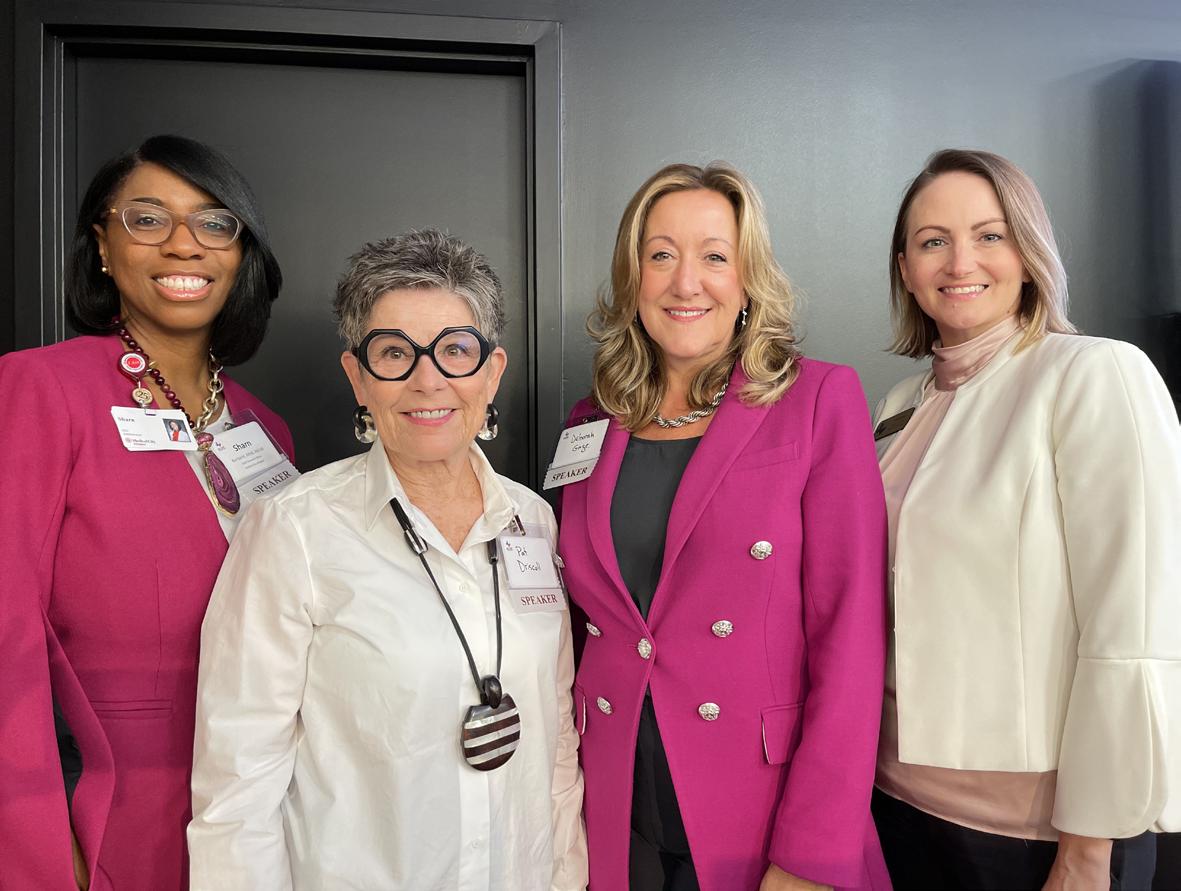
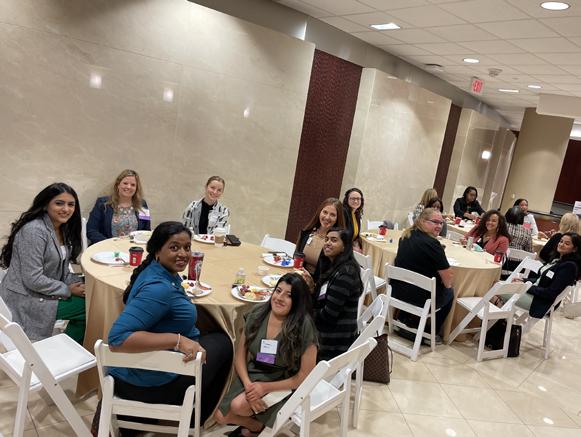


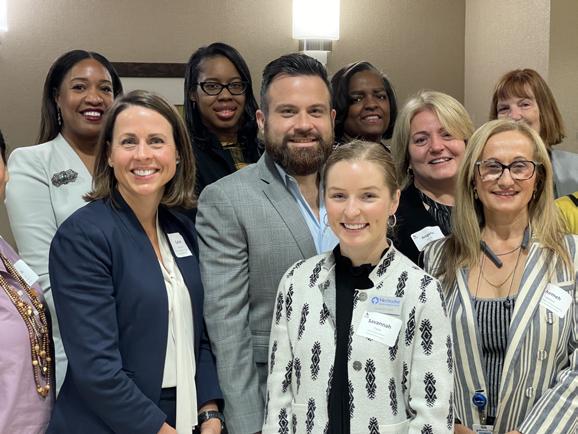
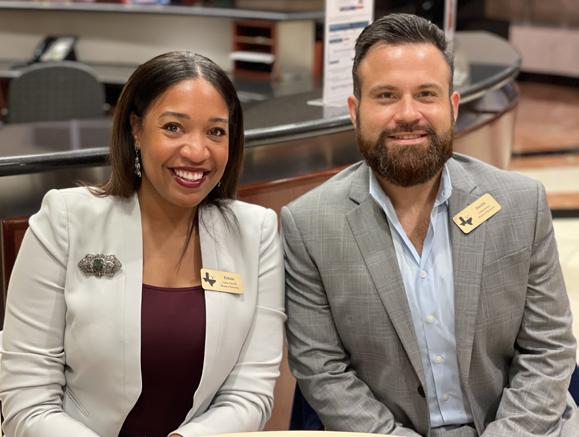
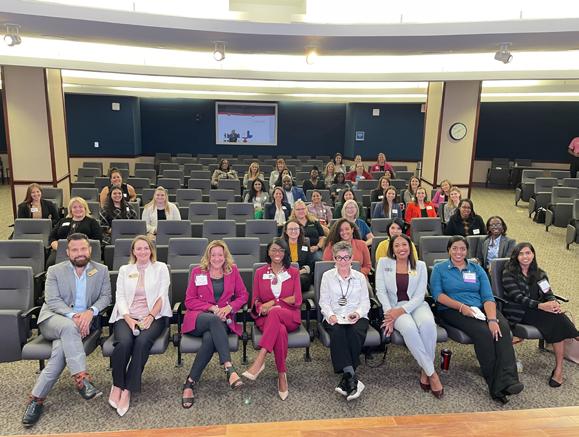
Asian Healthcare Leaders CommunityBreaking the Bamboo Ceiling
October 20, 2022
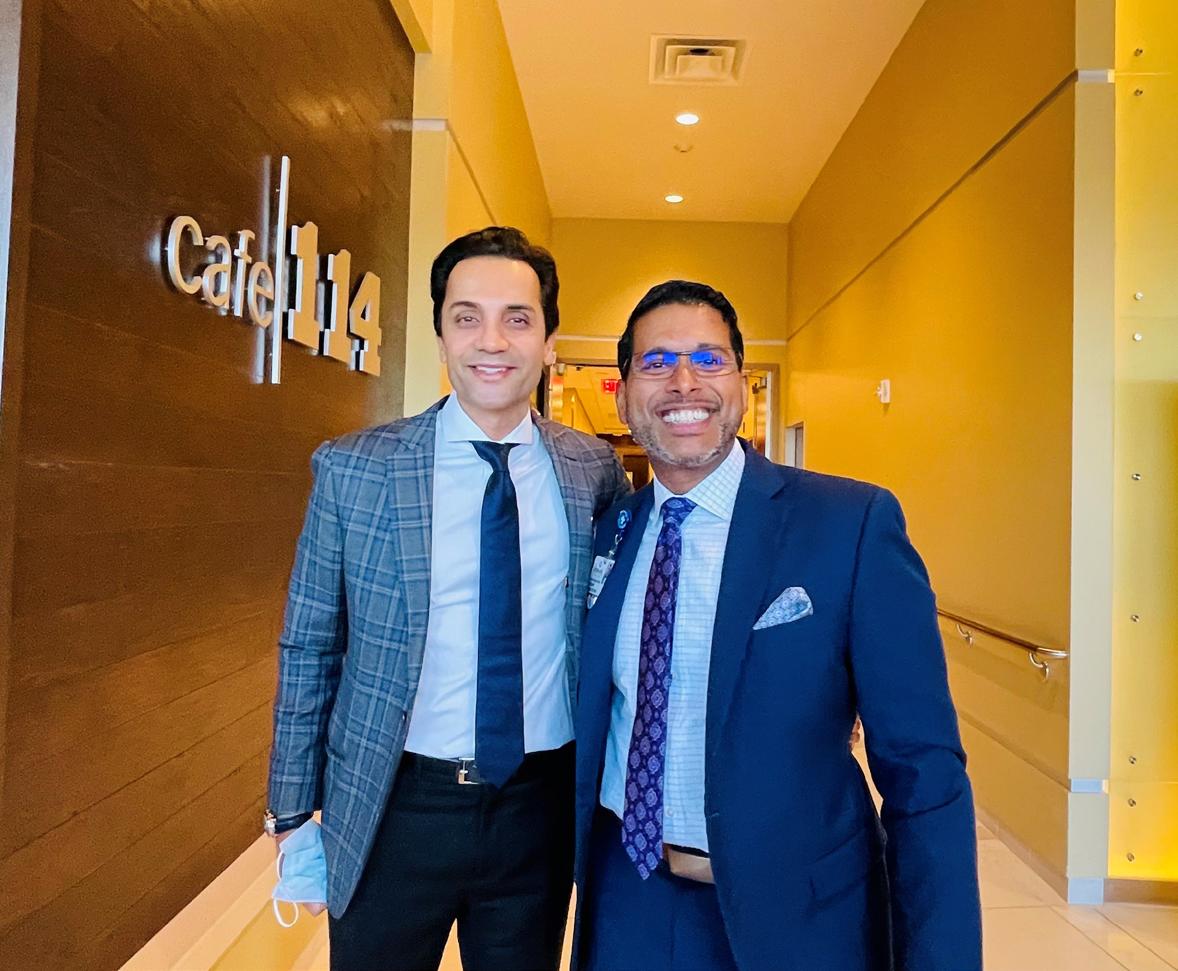
EVENT ENCORE






A Publication of the American College of Healthcare Executives of North Texas Chapter | SPRING 2023 To learn more, visit MethodistHealthSystem.org. Texas law prohibits hospitals from practicing medicine. The physicians on the Methodist Health System medical staff are independent practitioners who are not employees or agents of Methodist Health System. Methodist Health System complies with applicable federal civil rights laws and does not discriminate on the Creating healthier communities for over 90 years. @patient-physician-network @PPNHCo WWW.PPNHCO.COM For more information, please visit our website, or contact our Advisory Services Team directly at AdvisoryServices@drppg.com Patient Physician Network The Leader in Advancing Independent Medicine LET’S GET SOCIAL
Fourth Quarter Education Event
Explores Topics of Inclusion, Behavioral Health
October 27, 2022
By Audrianne Schneider, FACHE
Medical City Lewisville hosted the fourth quarter education event on October 27, 2022. This event offered two panels that focused on the topics of inclusion of employees and patients with disabilities and innovative approaches to providing Behavioral Health care to the community. Prior to beginning the discussion, the group observed a minute of silence to remember those affected by the shooting on October 22nd.
Moderated by Corey Wilson, FACHE, experts on the first panel discussed ways to foster inclusion with patients and employees with disabilities and how to overcome some of the barriers. “Disability” is defined as a physical or mental condition that limits a person’s movements, senses, or activities. Approximately 61 million (1 in 4) people in the U.S. have a disability (either born with it or acquired through life). There is a wide range of disabilities, many of which are not obvious. The takeaways included:
• Understand the climate and pulse of your organization –don’t take a “cookie cutter” approach.
• Meet people where they are.
• Follow the Special Olympics motto – that’s how we should live every day. It is“Let me win. But if I cannot win, let me be brave in the attempt.”
• We have lots of work left to do. This is an ongoing social justice and civil rights issue – each of us is responsible.
After dinner and networking, experts for the second panel discussed approaches to Behavioral Health that create value and address community needs. Moderated by Kenneth Hutchenrider, Jr., FACHE, panelists discussed the sharp increase in suicide rates, the lack of funding in Texas, workforce needs and the benefit of telehealth to provide care.Recommendations included providing a strong business case when asking for funding, delving into the risk events and looking at claims and the financial incentives to fill the gaps. One innovative approach mentioned involved using iPads during the every 15-minute rounding for safety.
Christi Nguyen, FACHE, closed the session by thanking the panelists and announcing a donation in honor of their service to the ACHE North Texas Leadership Legacy Fund.
Panel 1: Fostering the Inclusion of Patients and Employees with Disabilities
Corey Wilson, FACHE; Chief Operating Officer, Texas Health Harris Methodist Hospital Fort Worth (Moderator)
Rachel Brooks; Division Director, DE&I, N TX Division, Medical City Healthcare
Francisco Gonzalez; Manager of Hospitality and Guest Relations, Texas Health Presbyterian Hospital Dallas
Dr. DeLancey Johnson; Senior Vice President & Associate Chief Talent Officer, Parkland Health
42 A Publication of the American College of Healthcare Executives of North Texas Chapter | SPRING 2023
EVENT ENCORE




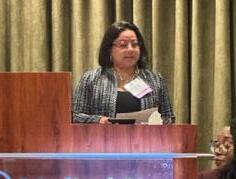

EVENT ENCORE
Monique Roland; Manager, Integrated Disability Management, Texas Health Resources

Panel 2: Behavioral Healthcare: Approaches to Increase Value for the Organization and Meet Community Needs

Kenneth Hutchenrider, Jr. , FACHE; President, Methodist Richardson Medical Center (Moderator)

Scott Domingue, MBA, BSN, RN, NEA-BC, CMSRN Chief Operating Officer & Chief Nursing Officer of Behavioral Health, Texas Health Resources

Teneisha Kennard, Executive Director of Behavioral Health – Ambulatory Services, JPS Health Network
Diane Partin, LPC-S, Administrative Director of Behavioral Health Outpatient Services, Medical City Green Oaks
INNOVATIVE CARE. AWARD-WINNING TEAM.
Children’s HealthSM is redefining incredible care. With the support of our executive team, we’re able to pursue groundbreaking research and innovative medical technology to offer better treatments every day. Together, we’re providing more incredible care for kids across Dallas, Plano and beyond.
Learn more at childrens.com

2022 Mentorship Closing Ceremony November




A Publication of the American College of Healthcare Executives of North Texas Chapter | SPRING 2023
EVENT ENCORE
3, 2022

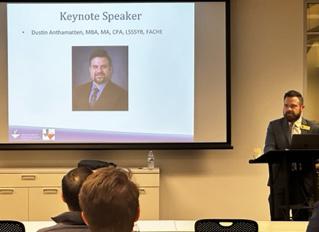




Asian Cultural Impact on Networking Strategies
December 1, 2022
On December 1, 2022, the Asian Healthcare Leaders Community of North Texas held its networking and educational event, “Asian Cultural Impact on Networking Strategies,” at Christus Health in Irving, Texas. The event had a panel discussion moderated by Vanessa Lee, which included Vidya Ayyr and Viswanathan Sahadevan.



Vidya Ayyr, MPH, CHW, is the Director of Community Social Impact at Parkland Health, as well as the Founder and CEO of Braincharge, a nonprofit that serves the community of caregivers who are supporting individuals impacted by brain-related trauma, injury, or illness.
Viswanathan “Vishy” Sahadevan, MS, is the Chief Administrative Officer of Texas Institute for Neurological Disorders.
During the panel discussion, Vidya and Viswanathan discussed the importance of networking, relationships, personal branding, and finding a professional mentor. Our panelists also answered questions from the crowd regarding the importance of addressing biases, connecting with allies, following up after networking events, and utilizing resources.
Special thank you to CHRISTUS Health for hosting this event.
EVENT ENCORE






Networking Blitz
November 15, 2022
By Audrianne Schneider, FACHE
ACHENTX Networking Blitz – Nov. 15, 2022
The positive energy in the room at Texas Health Harris Methodist Hurst-Euless-Bedford (THHEB) was evident as more than 40 professionals at every career level gathered for the Networking Blitz event on November 15, 2022.



The evening began with a round of Networking Blitz Bingo so that attendees could get to know more about each other. John Whittemore, Executive Director, ACHE of North Texas, provided an overview of the chapter, ways to get involved through a variety of committees and the different ways the chapter supports the journey to the Fellow credential and career resources, including the Mentor Program.
Did you know that ACHENTX is the second largest chapter in the country with more than 1,750 members New York is the largest)?
Jared Shelton, President, THHEB, shared his career journey with the group and emphasized the importance of building and fostering strong relationships. He also provided some networking tips for people at any stage in their career.
The discussion concluded with a “thank you” to the event sponsors and to the Membership & Networking Committee for making the event possible.
EVENT ENCORE






Breakfas t with the President - Benson Chacko, FACHE
December 6, 2022
All Roads Lead to Home: Coffee with Benson Chacko Hospital president describes the journey that crisscrossed the country only to find himself back in North Texas.
by: Bert Witherspoon
On December 6, 2022, with a witty quip of the event’s name change, Benson Chacko, president of Methodist Southlake Hospital, easily pivoted with “We’re going to have ‘Coffee with the Chief’ until the food arrives”. That morning, many of the members of the ACHE North Texas chapter had gathered for one of the year’s most anticipated events called Breakfast with the Chief. Colleagues arrived and began networking, while Chacko had a look of concern on his face. The food hadn’t made it to the event yet and he had thirty-five or more members waiting. But just like the many adventures along his journey to his current role, he wasn’t going to let it get the best of him.
Benson soon dived right into his hospital system’s background, mission, vision, and core values, noting that he begins all meetings with a Care Commitment story. You could sense his passion for his personal religious beliefs as he gave insight into the Methodist Health System.
Benson said that healthcare was in his genes. Growing up in Coppell, Texas, the son of Indian immigrants, his mother was a nurse with an enormous faith. He called
his mom a P-T-L mom. PTL is an acronym for “Praise The Lord.” Every time his mother would encounter good news, she would exclaim, “Praise The Lord”.
Benson knew from an early age that his life’s path would place him squarely in healthcare. Although his parents urged him to become a physician, Benson found his passion in healthcare administration. His journey began as a candy striper volunteering his time at his mother’s hospital, St. Paul Medical Center, in Dallas, Texas.
By this time, the Methodist staff had delivered the food he was so eagerly awaiting. A breakfast spread fit for a king that included pastries, fruit, souffle, smoked salmon and cream cheese spread for an assortment of bagels, and quite possibly the best chicken and waffles a hospital has ever made. This caused Benson to produce a sigh of relief and excuse the audience to grab a plate and cure the stomach pangs of the morning.
After the pause for food gathering, Benson settled in and went on to detail his educational stops along the way starting with Lamar University, Southwest Texas State University, and eventually Texas Woman’s University for his graduate studies. His undergraduate studies concluded with an internship at HCA’s Medical City Dallas within the HR department. After the internship, he remained with Medica City for seven years and completed his graduate work at Texas Woman’s University.
Once graduate school was completed, he then found himself headed to the Golden State to begin his Administrative Fellowship with Lucille Packard Children’s at Stanford University Medical Center Outpatient Center. Learning some major professional lessons there, he boldly described his takeaways as game changers for the rest of his career path. He detailed that asking questions won’t get you fired. He reminded us that good HR is proactive, not reactive. Actions speak louder than words. And lastly, Microsoft Excel is your friend.
52 A Publication of the American College of Healthcare Executives of North Texas Chapter | SPRING 2023
ENCORE
EVENT
EVENT ENCORE
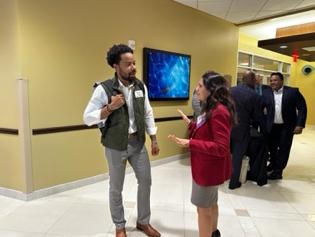

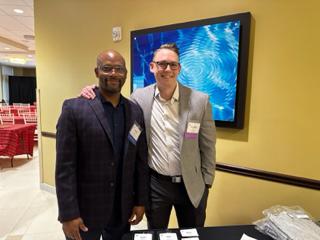



EVENT ENCORE
Benson and his newlywed wife decided that it was time to move back to Texas to be closer to family. That brought him to El Paso, Texas as the Associate Administrator for a 110bed hospital with Tenet Healthcare. But before leaving, he again gained some wisdom. He noted, “Don’t judge a book by its cover. The information is in the data…you just have to look, execute, build trust, and you get more opportunity. A high-functioning collaborative team moves mountains.” Ironically, I wonder if he knew that El Paso to California was closer than El Paso to his next stop in Saint Louis, Missouri.
Either way, I am sure that the decision to leave Texas again and head to the Show Me State of Missouri was an easy decision when offered the promotional opportunity to become Chief Operating Officer (COO) within Tenet Healthcare. There he picked up some more great lessons while making some of the most amazing connections of his life. He spoke of learning as much as you can—take a 360-degree approach, beware of biases, and spend time teaching those who are willing [to learn]. He also noted that snow looks far better in pictures than in person.
Not long after his time in Saint Louis, the calling from El Paso came back. His inevitable return to Texas had begun. On his second stint in El Paso, he returned now as the COO of Tenet’s 350-bed hospital.

Again, he detailed the lessons learned there.
Yet something was still causing Benson and his wife to be drawn back to the Metroplex to be nearer to family. His small family’s move this time would land him right back in the North Texas area.
Benson took on the role of COO, and eventually Interim
Chief Executive Officer, at Tenet’s joint venture hospital with Baylor Scott and White in Rowlett, followed by joining Methodist Health System as the Vice President of Operations (COO) at Methodist Dallas Medical Center. A short while later, Methodist acquired their Southlake campus and named Benson as President.
Benson Chacko had crisscrossed the country to find his way right back home, leading a brand new hospital of his own. From Coppell, Texas to northern California, down to El Paso, across the Midwest to Missouri, and back to El Paso before finally landing in his own backyard, the life lessons in business have driven him to a perspective that few will ever get to have.
Ever strong in his PTL faith, Benson Chacko left the audience with one last parting piece of wisdom.
“God has planted greatness in you. Let Today be the beginning of a great adventure as you step into the gifts He’s given you.” --Joyce Meyer









Community EventTarrant County Food Bank December
10, 2022
ACHENTX Members Rolled Up Their Sleeves to Roll Out Meals
by Bert Witherspoon
On Saturday, December 10, 2022, over thirty members and guests of the ACHENTX arrived at the Tarrant Area Food Bank (TAFB) to serve by packaging foodstuffs for distribution to the community in need. Combined with donations from Hello Fresh, volunteers were able to assemble almost 7000 individual meals. Members not only volunteered their own personal time but that of their families and friends as well. Some brought their spouses, some brought their grown children, and some came alone to spend a few hours serving TAFB.
The group started with a short informational gathering in a community room where leaders of the volunteer committee gave details of how the process worked. They were then provided an opportunity to network and engage with other members while enjoying a cup of coffee and a small pastry. Soon after, a TAFB leader rounded the members and guests up to deliver a how-to on the process of bagging and packaging the items for distribution.
Members were then taken to the warehouse packing floor where they were divided into groups and given more explicit instructions.
An assembly line soon then formed with members jumping in wherever they thought they could best be utilized. Some were unboxing the raw vegetables. Some were disassembling packages of shredded cheese. And others were hauling small bags of rice to the assembly tables.
Once the process was completely and totally understood by all, the TAFB leader gave the goahead for production. As fast as they could, members assembled what amounted to a Cheesy Rice Vegetable meal, to be cooked by the receiver, in brown paper grocery bags and loaded into huge bins.
Labels were attached to each bag to ensure closure and identification of the bags’ contents.
Because of this large group of healthcare professionals, quality was high. Any time that an errant or extra vegetable was placed in a bag, it was quickly removed and resorted to another approaching bag. Following the nuances of the Toyota Production System, any member along the line could stop the line for a quality control inspection and solution if an error was found. Members intrinsically enjoyed this type of efficiency and casually joked about it.
Despite the tasks being simple and repetitive, members worked hard enough to break a sweat. It wasn’t long before they were doffing their winter-time sweatshirts, pulling long hair into ponytails, and rolling up sleeves to dive deep into the Henry Ford-style assembly line of bagging groceries.
The work was short-lived as they quickly noted and recalled the John Heywood phrase that “many hands make light work”. However, this group wouldn’t have been afraid to do hard work—all because of the “WHY”.
56 A Publication of the American College of Healthcare Executives of North Texas Chapter | SPRING 2023 EVENT ENCORE
The group’s “WHY” was lodged firmly in the spirit of giving back—specifically giving back to a community that had given them all so much. This random assortment of healthcare leaders and professionals has gained far more value through their positions within the healthcare industry than most will probably know. Giving back to a community that is in such need was the undercurrent of why they were all there.
When the bagging and packaging of these items were complete, the boxes were loaded onto pallets, and the group had a chance to reflect on their work, the leader from TAFB performed some quick math facts. The volunteers from the ACHE of North Texas (ACHENTX) had broken a record for the most number of meals prepared in three hours.



It is sometimes said, “If you’re not serving, you’re swerving”. The ACHENTX finds ways to keep themselves on a straight line as they continuously find ways to serve and give back to the community.
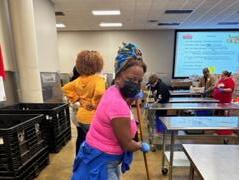
EVENT ENCORE
Breakfast with the President, Blake Kretz, FACHE
February 7, 2023
On Tuesday February 7th North Texas ACHE members and guests met for breakfast at Texas Health Resources Arlington Memorial Hospital to hear the story of the current president, Blake Kretz, FACHE, MHA.
Blake opened the discussion by sharing some highlights about Texas Health Resources (THR), an organization that has been in the DFW market for over 25 years. THR has 29 hospitals, 400 primary care providers, 360 specialists, 22 urgent care centers, 32 ambulatory surgery centers and an affiliation with University of Texas Southwestern. In 1958 the original Arlington Hospital opened. Arlington Memorial is currently a 369bed Level III trauma center with all specialty surgery services including neurology and cardiology. Arlington Memorial has a Level III NICU and a top-notch women’s health program. The hospital has been voted the best emergency department in Arlington and provides exceptional heart and vascular care.
Blake continued the meeting by sharing his personal story and journey within healthcare. Blake originally wanted to be a physician. He graduated from Abilene Christian University where he played on the football team. He received his Masters in Health Administration from the prestigious Trinity University in San Antonio, Texas.
Blade recognized that the path to medicine was not for him, but he needed to support himself while he found his true path forward. Blake initially sold encyclopedias
door to door. He later became an assistant to a local orthopedic group in Lewisville and found himself scrubbing in at the OR on his first day on the job.
Blake pursued a career in administration by beginning as an administrative fellow in Salt Lake City at St. Mark’s Hospital (an HCA facility). Afterwards, Blake continued to work with HCA in the affiliated HealthTrust organization.
Blake’s first leadership role was as the Chief Executive Officer of Graham Regional Medical Center, a 25-bed hospital in a community of 10,000 people. Blake thought he would stay in Graham for one year but found Graham to be his home for over 12 years.
His next position was to serve as President of THR Cleburne, a 120-bed hospital. It is a facility that Blake described as more complicated than Graham but small enough for him to be involved in all aspects of the organization.
Blake has continued to work with THR and has served as President of Arlington Memorial for the past eight years. He has found the ability to partner with physicians to be a great challenge but a very necessary skill that he continues to practice. Leading a much larger organization has provided Blake the opportunity to be more strategic and mission oriented. He finds himself looking at the full continuum of patient care and community growth.
To conclude our time together, participants asked Blake several questions and he was extremely communicative when sharing his thoughts on the topics. Blake shared that he believes hospitals are changing and will continue to evolve. He believes hospitals need to expand and care for patients outside the inpatient setting. He believes that hospitals must help the local community members take better care of themselves in general and help support patients more outside the walls of the inpatient setting.
58 A Publication of the American College of Healthcare Executives of North Texas Chapter | SPRING 2023 EVENT ENCORE






EVENT ENCORE
Are
you ready to effect positive change in your organization and community?
You are invited to apply for the 2023 Thomas C. Dolan Career Accelerator Program—a program committed to empowering a new generation of top-level healthcare leaders who reflect the diversity of the communities they serve.
This exclusively virtual six-month program is an opportunity to leverage specialized education, mentoring sessions and career assessments to help you reflect and grow as a leader.

Earn up to 25 ACHE Face-to-Face Education and Interprofessional Continuing Education credits. Dive into diversity, equity and inclusion in healthcare through unique learning experiences. Connect with specially selected mentors. Network with a broad range of healthcare leaders.
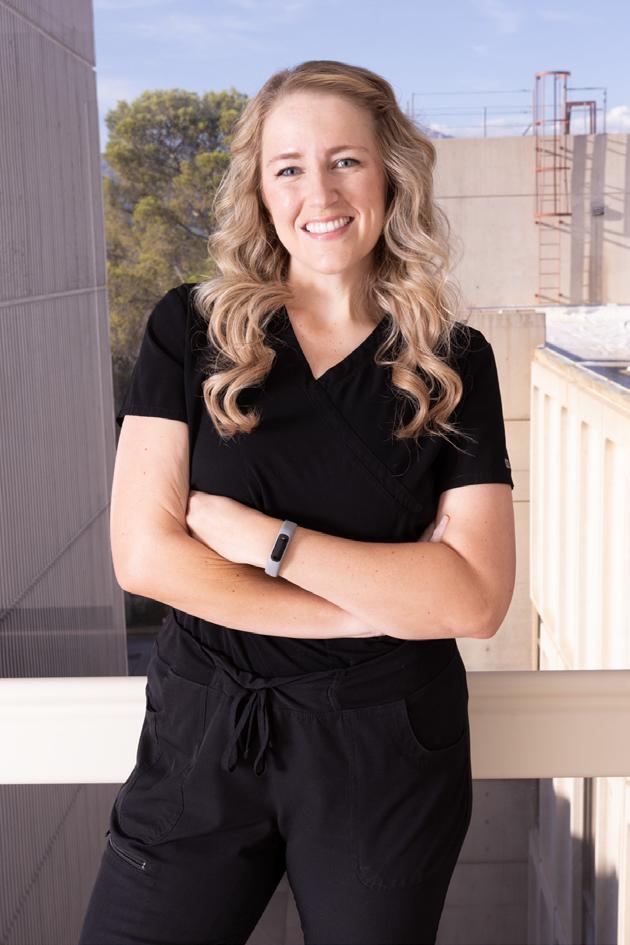
Career Accelerator Program Scholarships are made possible by and wholly funded through the Fund for Healthcare Leadership. Don’t miss this chance to be a part of the solution to providing more equitable care in our communities.

National News



At Texas Health, we will be there for you and your loved ones. With an experienced staff and technologically advanced care, our dedication is to your health. Whether you need 24-hour emergency care or wellness services, we’re equipped to handle your health care needs. Advanced Surgical Procedures ■ Behavioral Health Cancer ■ Diabetes ■ Digestive Health Emergency Department ■ Heart & Vascular Neurosciences ■ Orthopedics ■ Weight Loss Surgery Women & Infants ■ Wound Care Doctors on the medical staffs practice independently and are not employees or agents of Texas Health hospitals or Texas Health Resources. © 2018 1-877-THR-WELL | TexasHealth.org Putting your health above it all.
WELCOME ACHENTX’S NEWEST MEMBERS
SEPTEMBER
1LT Tyler Fields, MHA
Abiola Anyebe, DPT, MBA
Ashley Amerman
Ashley K. Beal, MSHA
Ashley Millsaps
Asifa R. Ashraf, MD
Austin Anderson
Brandon Bayles, DPT, PT
Charter Rushing, ScD
Dai H. Chung, MD
David T. Wright, MS
Denise Gee
Elaine Henry
Frederick A. Ridge, Jr., MS
Gwen Drake, III, MHA
Henna Khan
Homer Walag
Jarael G. Hornsby
Jeannie Cook, APRN, NP
Jessica Norsch
Jocelyn N. Barracoso
John Varghese
Joseph Sauser
Komal Broker
Kourtni N. Retzloff, BS
Oluwatosin O. Agboola, MBA
Robert Kamali, MD
Samuel Adrignola, PT, DPT
Sashi Padarthy
Tam Hoang
Tonia Bellard, MHSA
Tu Le, MHA
Whitney Johannessen, PhD
William K. Foshee, DC
OCTOBER
1LT Marlise Curlee, DNP, RN
Allison E. Ghatak
Brian Sims
Eric Medaris
Heather Hambrick, DHA, MBA
Hunter H. Hall, BS
Inez Eddington
Isabel Pena-Dumais
Jolie Allen
Joshua Ruiz
Lila P. Belitz, MSW
Mary A. Ann Navarro
Nathan Curtis
Oyeniyi O. Oyesina, MD, MBA
Rodneisha L. Powell, MBA
Ryan Machos
Sosna A. Gellaw
Susan L. Cole, MBA, BA
Tejas K. Patel, DPT, PT
Troi N. Ott
Uneca Johnson
NOVEMBER
Allison Meshnick
Andrea Lowrey
Ashley Perry, MHA
Cedrina A. Falkner-Shaw
George H. Ellis, JD
Kassandra Bravo, MHA
Kim Waters
Leslie Cler, MD
Loren Fouch, LCSW
Michael Tate, MD, MBA
Michele S. Hensley, BSc
Nikia Jewitt
Ramon Guerrero, MD
Tamara J. McJunkin
Tom Wilken, MS
DECEMBER
Aasma Khandekar, MD, MBA
Akreeti Pokhrel
Bradford Harrold
Cristal Retana Lule
Elizabeth Greenwood
Justin Keller
Matthew Karpas
Nakia Smith, MBA
Raghavendran Srinivasan
Shaneequa Robinson
Srinivas Polineni
Tara Di Pasquale Bradshaw
Tomas Armendariz, Jr.
JANUARY
Kellie E. Barrett
Whitney Bendel, MBA
Kristy Broussard
Tiandra Caesar
Mikkie Chu
Kiera DeJerinett
Maryclare Dike, MHA, MS
Lomax Edwards, III
Azadeh Farahmand
JAMESGREEN FOCHO
Jessica Guerra
Angela Gutierrez
Colton Hager
Maria M. Hamud
Jillian Heil
Lauren Horton
Rudolph Jackson, III, MHA
Justin John, MHA
Jenny Johnson
Brenna Kelly
John F. Marucci, MD
Aarushi Mehta
Jeffery C. Metzger, MD, MBA, FACEP
Jennifer Moody
Joy N. Patel, BS, MHA
Neesha Quinn
Loretta Ragsdale
Robert A. Ritchey, MS
Christopher W. Smith, MHA
Marissa Smith
Tonya Sosebee
Byron K. Wallace
Jill M. West, PhD
Stormee Williams, MD
Treanika S. Williams , BSN
Clayton Wood
Christopher M. Zuloaga
ACHENTX’S NEWEST FELLOWS
SEPTEMBER
Day-Vene C. Gilliam, FACHE
NOVEMBER
Shelton T. Williams, FACHE
Tammy D. Stilling, FACHE
DECEMBER
Angela A. Michael, FACHE
Brian T. Asmussen, MBA, FACHE
Quyet V. Tran, RPh, MBA, FACHE
JANUARY
Julie A. Buchl, FACHE
RECERTIFIED FELLOWS
SEPTEMBER
Allen Marsh, FACHE
Annette P. Palm, DHA, FACHE
Jared C. Shelton, FACHE
Mari J. Finley, DNP, RN, APRN, FACHE
Silvia B. Rose, RN, MSN, FACHE
OCTOBER
Andrew M. Welch, MHA, FACHE(R)
Jay T. deVenny, FACHE
Marc A. Gelinas, LFACHE
NOVEMBER
Andrew M. Welch, MHA, FACHE(R)
Jay T. deVenny, FACHE
Marc A. Gelinas, LFACHE
DECEMBER
Barry G. Howell, MBA, FACHE
Brandy J. Frawley, FACHE
Britt R. Berrett, PhD, LFACHE
Denise B. Elliott, FACHE
Felixia A. Colon, FACHE
Jaquetta B. Clemons, DrPH, FACHE
Joe Wilkins, FACHE
Jon C. Skinner, FACHE
Joseph C. Lawrence, FACHE
Joshua A. Floren, FACHE
Kyle Kirkpatrick, FACHE
Lenetra King, FACHE
Mitchell Koger, FACHE(R)
Patrick Brown, FACHE
Paula R. Brandon, FACHE(R)
Richard G. Greenhill, DHA, CPHQ, FACHE
Ronald E. Coulter, MHA, FACHE
Steven K. Whitson, FACHE
Tracy Giacoma, RN, FACHE(R)
Virginia H. Rose, FACHE
William H. Craig, LFACHE
JANUARY
Dani-Bree Bialek, FACHE
Richard B. Day, FACHE
Nancy Jennings, DBA, FACHE
Sharon J. Maples, FACHE
Ernie W. Sadau, FACHE
Nishu Wadhawan, FACHE
A Publication of the American College of Healthcare Executives of North Texas Chapter | SPRING 2023 63
All these listed events are scheduled to be held virtually. Please keep monitoring our Weekly Announcements for other virtual and in-person events in the works.
Tuesday, March 28 After Hours Networking Event: Game Show Battle Rooms
Game Show Battle Rooms, Farmers Branch
Wednesday, April 5 New Horizons: From Graduation to Leadership
Children’s Health Plano
Thursday, April 6 Q1 Education Event
1) Ethical Challenges in Healthcare Leadership
2) Telemedicine in the Healthcare Delivery System”
Thursday, April 13 Boba with the A(HLC) Tea-m
Tuesday, April 18
Tuesday, April 25
Friday, May 19
Breakfast with the EVP & CCO - Dr. Sam Bagchi
Cocktails with the Chiefs
BOG Review Course
Virtual
9 Rabbits Bakery, Dallas
CHRISTUS Health, Las Colinas
Stirr in Addison
THR Arlington
Click here to learn more or register for an event
We Appreciate the Support of Our ACHENTX Platinum Sponsor


We Appreciate the Support of Our ACHENTX Gold Sponsors
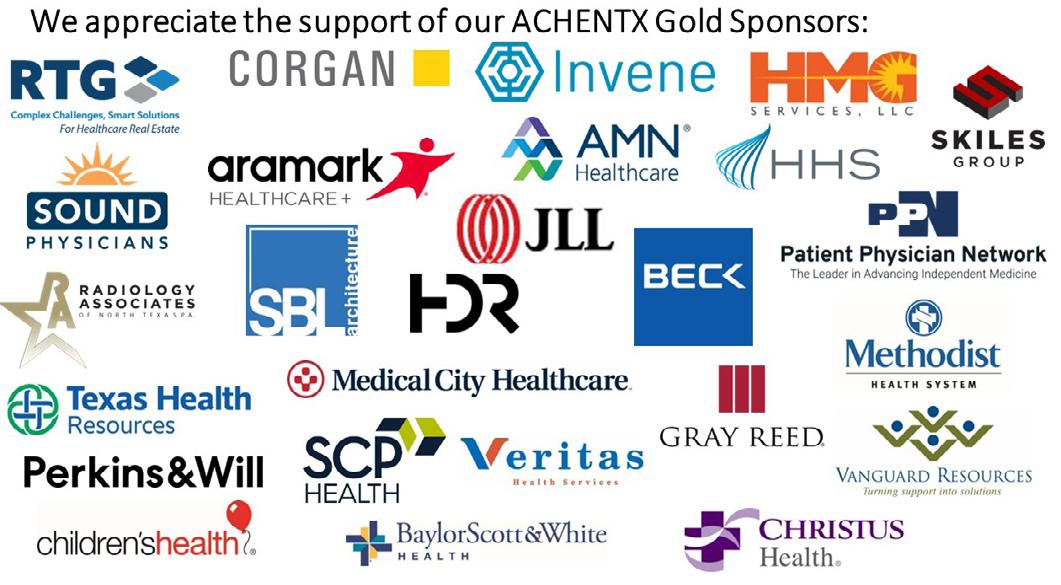
A Publication of the American College of Healthcare Executives of North Texas Chapter | SPRING 2023 65



 Felixia Colon, FACHE Sr. Vice President & Group Operations Officer SCP Health
Felixia Colon, FACHE Sr. Vice President & Group Operations Officer SCP Health




 2022 ACHE of North Texas Emerging Leader Regent’s Award
Angela Vincent Michael – Director of Performance Improvement, Methodist Health System
2022 ACHE of North Texas Executive Servant Leader Regent’s Award
2022 ACHE of North Texas Emerging Leader Regent’s Award
Angela Vincent Michael – Director of Performance Improvement, Methodist Health System
2022 ACHE of North Texas Executive Servant Leader Regent’s Award



 Dr. Trinette K. Pierre, DHA, BSN, RN, CCC, CEC, CHLC, FACHE, NEA-BC Regent – Texas Northern
Dr. Trinette K. Pierre, DHA, BSN, RN, CCC, CEC, CHLC, FACHE, NEA-BC Regent – Texas Northern




























 Shahid Shafi, MD, MBA, MPH
Shahid Shafi, MD, MBA, MPH







 By James Taylor, MBA, MAGS Group President and CEO of Physician and Leadership Solutions for AMN Healthcare
By James Taylor, MBA, MAGS Group President and CEO of Physician and Leadership Solutions for AMN Healthcare
















































































































